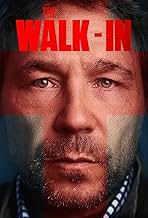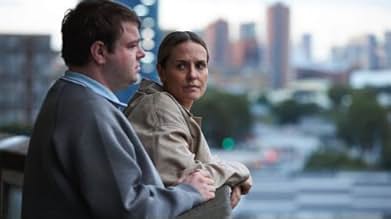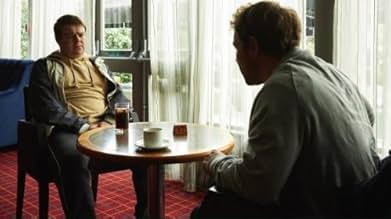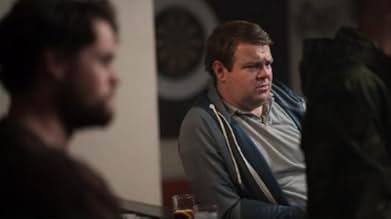The Walk-In
- Mini serie TV
- 2022
- 45min
Segue un neonazista che progetta di uccidere un deputato e come il suo piano è stato sventato da un uomo dall'interno.Segue un neonazista che progetta di uccidere un deputato e come il suo piano è stato sventato da un uomo dall'interno.Segue un neonazista che progetta di uccidere un deputato e come il suo piano è stato sventato da un uomo dall'interno.
Sfoglia gli episodi
Recensioni in evidenza
This is TV drama at its best, well written, researched, directed and acted. I never usually watch anything on ITV as most of their output is made up of boring police series, but I'm glad I watched this compelling drama based on the book by Matthew Collins. Stephen Graham as always is excellent as is Andrew Ellis who plays Robbie. I found all of the performances realistic quite moving at times. The series is a warning to us all that we must stand up and fight the far right and their ideas wherever we come across them. My only complaint is the sheer number of adverts during each episode. In reality each episode is about 40 minutes long.
It goes without saying that if Stephen Graham's name is listed on a new drama series, then you know it is an excellent bet to watch.
And The Walk-In is just that. A hard-hitting and tough drama to watch. Based on real events, amidst the shocking murder of Jo Cox in 2016 - a week before the Brexit Referendum - this drama series is raw, gripping and highly disturbing throughout. The script was authentic and most sensitive to what really happened during this time. The direction was very intelligent balancing some very difficult scenes with humanity and sensitivity.
The acting was superior throughout but the stand-out performance for me was Robbie Mullen's character played by Andrew Ellis: he simply lived and breathed the role and it would not be unfair to say he gave Stephen Graham a run for his money. He has a bright TV future ahead.
This is yet another top-notch drama series to hit our screens and yet another which more than delivers.
I highly recommend.
And The Walk-In is just that. A hard-hitting and tough drama to watch. Based on real events, amidst the shocking murder of Jo Cox in 2016 - a week before the Brexit Referendum - this drama series is raw, gripping and highly disturbing throughout. The script was authentic and most sensitive to what really happened during this time. The direction was very intelligent balancing some very difficult scenes with humanity and sensitivity.
The acting was superior throughout but the stand-out performance for me was Robbie Mullen's character played by Andrew Ellis: he simply lived and breathed the role and it would not be unfair to say he gave Stephen Graham a run for his money. He has a bright TV future ahead.
This is yet another top-notch drama series to hit our screens and yet another which more than delivers.
I highly recommend.
Terrific drama, beautifully performed and well-paced. I notice that a previous reviewer suggests that the series avoided 'points scoring and let events speak for themselves', but I beg to differ. There were, in fact, any number of 'right-thinking' lectures in the episodes, which were rather patronising. It is perfectly possible to be proud of established British culture without choosing violence or extremism. The closing titles were a perfect example of Disraeli's 'lies, damned lies, and statistics'. It was meant to reinforce the writer's view that 'far-right' terrorism is a threat greater than Islamic radicalism, but that argument would be shown to be nonsense in a detailed discussion.
The Walk-In sets out to tackle a serious issue: the growing threat of far-right extremism in the UK. Based on true events, it follows Matthew Collins, a former neo-Nazi who now works as an anti-racism activist, attempting to infiltrate and stop a white supremacist group from carrying out a violent plot. While the series' intentions are good, aiming to highlight the dangers of radicalization, its approach leaves much to be desired.
The first thing that stands out is the series' dramatization of neo-Nazi groups openly marching and demonstrating in public. While such groups undoubtedly exist, the portrayal of them as easily identifiable and brazenly active in the streets of the UK is, to put it bluntly, exaggerated. Most far-right groups today operate in the shadows, using online platforms and encrypted chats to spread their message-far removed from the kind of public Nazi marches shown in The Walk-In. The series risks inflating the threat by focusing on the spectacle rather than the more subtle, insidious methods of recruitment and radicalization that are far more common in today's climate.
For those who have lived in the UK and followed the political landscape closely, the portrayal of white supremacy as a visible, openly confrontational force feels out of touch. Instead of focusing on the quiet, dangerous ways extremist ideologies spread-through online echo chambers and hidden networks-the show leans into sensationalism for dramatic effect. This kind of exaggerated portrayal not only misrepresents the nature of the threat but also feels like a piece of politically charged content rather than a nuanced exploration of the issue.
While there is value in shedding light on the dark reality of far-right extremism, the series risks contributing to a narrative that may feel more like propaganda than a genuine attempt to inform. The danger here is that by making the threat of white supremacy seem like an obvious, easy-to-spot issue, The Walk-In distracts from the real, subtle ways these groups influence minds and shape society today.
Ultimately, The Walk-In serves as a reminder of the risks of sensationalizing complex issues. By pushing a narrative that plays into the fear-mongering of the far left, it feels disconnected from the reality that many of us live in. A more grounded, realistic portrayal would have been far more impactful, offering a clearer understanding of how extremism truly operates in modern Britain.
The first thing that stands out is the series' dramatization of neo-Nazi groups openly marching and demonstrating in public. While such groups undoubtedly exist, the portrayal of them as easily identifiable and brazenly active in the streets of the UK is, to put it bluntly, exaggerated. Most far-right groups today operate in the shadows, using online platforms and encrypted chats to spread their message-far removed from the kind of public Nazi marches shown in The Walk-In. The series risks inflating the threat by focusing on the spectacle rather than the more subtle, insidious methods of recruitment and radicalization that are far more common in today's climate.
For those who have lived in the UK and followed the political landscape closely, the portrayal of white supremacy as a visible, openly confrontational force feels out of touch. Instead of focusing on the quiet, dangerous ways extremist ideologies spread-through online echo chambers and hidden networks-the show leans into sensationalism for dramatic effect. This kind of exaggerated portrayal not only misrepresents the nature of the threat but also feels like a piece of politically charged content rather than a nuanced exploration of the issue.
While there is value in shedding light on the dark reality of far-right extremism, the series risks contributing to a narrative that may feel more like propaganda than a genuine attempt to inform. The danger here is that by making the threat of white supremacy seem like an obvious, easy-to-spot issue, The Walk-In distracts from the real, subtle ways these groups influence minds and shape society today.
Ultimately, The Walk-In serves as a reminder of the risks of sensationalizing complex issues. By pushing a narrative that plays into the fear-mongering of the far left, it feels disconnected from the reality that many of us live in. A more grounded, realistic portrayal would have been far more impactful, offering a clearer understanding of how extremism truly operates in modern Britain.
I absolutely adore Stephen Graham who chooses tough, hard hitting drama rather than any routine roles offered to him.
So it's personally disappointing to only give this a 7/10 because I think it could have been so much better.
The real life situations are hard enough to bear, but when dramatised then I just felt that they should have had more impact.
Acting was great, direction was a bit iffy and the editing was bearable.
But here was something missing which I can't quite put my finger on.
Maybe there was more of a story here regarding the conversion of Graham's character, or a deeper analysis of the different right wing factions and how they differed from each other and what drove them apart.
I could be alone in this, but I was disappointed.
So it's personally disappointing to only give this a 7/10 because I think it could have been so much better.
The real life situations are hard enough to bear, but when dramatised then I just felt that they should have had more impact.
Acting was great, direction was a bit iffy and the editing was bearable.
But here was something missing which I can't quite put my finger on.
Maybe there was more of a story here regarding the conversion of Graham's character, or a deeper analysis of the different right wing factions and how they differed from each other and what drove them apart.
I could be alone in this, but I was disappointed.
Lo sapevi?
- QuizMarcia's Cafe where Robbie and Matthew meet for the first time, is the same cafe that is present in the Top Boy series.
- ConnessioniReferenced in The Graham Norton Show: Stormzy/Geena Davis/Stephen Graham/Motsi Mabuse (2022)
I più visti
Accedi per valutare e creare un elenco di titoli salvati per ottenere consigli personalizzati
- How many seasons does The Walk-In have?Powered by Alexa
Dettagli
Contribuisci a questa pagina
Suggerisci una modifica o aggiungi i contenuti mancanti


![Guarda Trailer Season 1 [OV]](https://m.media-amazon.com/images/M/MV5BNTY0OGNiYjctOGY3NC00MzU2LWIwNGUtODY2NGRlNDM1NzI1XkEyXkFqcGdeQXRyYW5zY29kZS13b3JrZmxvdw@@._V1_QL75_UX500_CR0)































